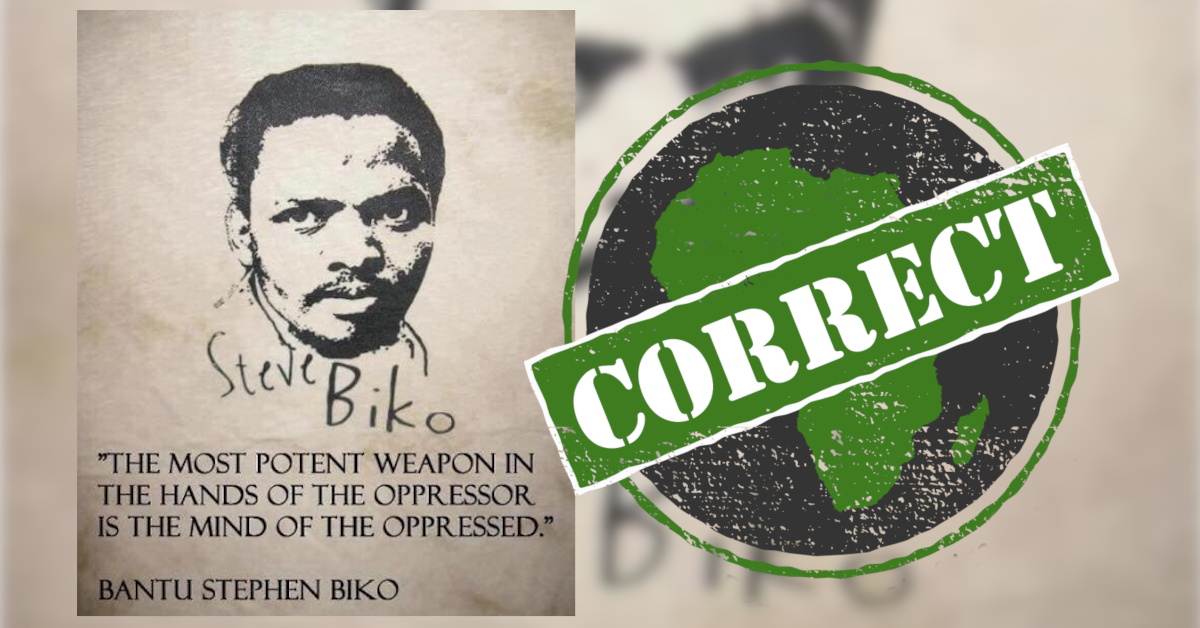“The most potent weapon in the hands of the oppressor is the mind of the oppressed.”
A graphic shared on Facebook attributes this quote to the late South African anti-apartheid activist Steve Biko.
It shows a photo of Biko, and has been flagged as possibly false by Facebook’s fact-checking system.
Is the quote by Biko? Yes, it is.

Stephen Bantu Biko, born in 1946, was a founder of the South African Student Organisation and the country’s Black Consciousness Movement. He was murdered by the apartheid government’s security police on 12 September 1977, when he was 31.
Biko used the phrase – “the most potent weapon in the hands of the oppressor is the mind of the oppressed” – in two of his essays.
The first is Black Consciousness and the quest for true humanity, and the second White racism and Black Consciousness.
Both essays – and the quote – are included in I write what I like, a collection of Biko’s work first published in 1978, the year after his death.
In the book, the essay White racism and Black Consciousness runs from page 61 to 71, and Black Consciousness and the quest for true humanity from page 87 to 98.
Biko used the same phrasing in both essays to emphasise how the philosophy of black consciousness could be used, in turn, as a powerful weapon in the fight to end apartheid.
He was arguing the point that black people living under apartheid faced not only economic and political oppression, but also the oppression of their identity. – Sam Ancer
A graphic shared on Facebook attributes this quote to the late South African anti-apartheid activist Steve Biko.
It shows a photo of Biko, and has been flagged as possibly false by Facebook’s fact-checking system.
Is the quote by Biko? Yes, it is.

‘I write what I like’
Stephen Bantu Biko, born in 1946, was a founder of the South African Student Organisation and the country’s Black Consciousness Movement. He was murdered by the apartheid government’s security police on 12 September 1977, when he was 31.
Biko used the phrase – “the most potent weapon in the hands of the oppressor is the mind of the oppressed” – in two of his essays.
The first is Black Consciousness and the quest for true humanity, and the second White racism and Black Consciousness.
Both essays – and the quote – are included in I write what I like, a collection of Biko’s work first published in 1978, the year after his death.
In the book, the essay White racism and Black Consciousness runs from page 61 to 71, and Black Consciousness and the quest for true humanity from page 87 to 98.
Biko used the same phrasing in both essays to emphasise how the philosophy of black consciousness could be used, in turn, as a powerful weapon in the fight to end apartheid.
He was arguing the point that black people living under apartheid faced not only economic and political oppression, but also the oppression of their identity. – Sam Ancer
Republish our content for free
For publishers: what to do if your post is rated false
A fact-checker has rated your Facebook or Instagram post as “false”, “altered”, “partly false” or “missing context”. This could have serious consequences. What do you do?
Click on our guide for the steps you should follow.
Publishers guideAfrica Check teams up with Facebook
Africa Check is a partner in Meta's third-party fact-checking programme to help stop the spread of false information on social media.
The content we rate as “false” will be downgraded on Facebook and Instagram. This means fewer people will see it.
You can also help identify false information on Facebook. This guide explains how.



Add new comment